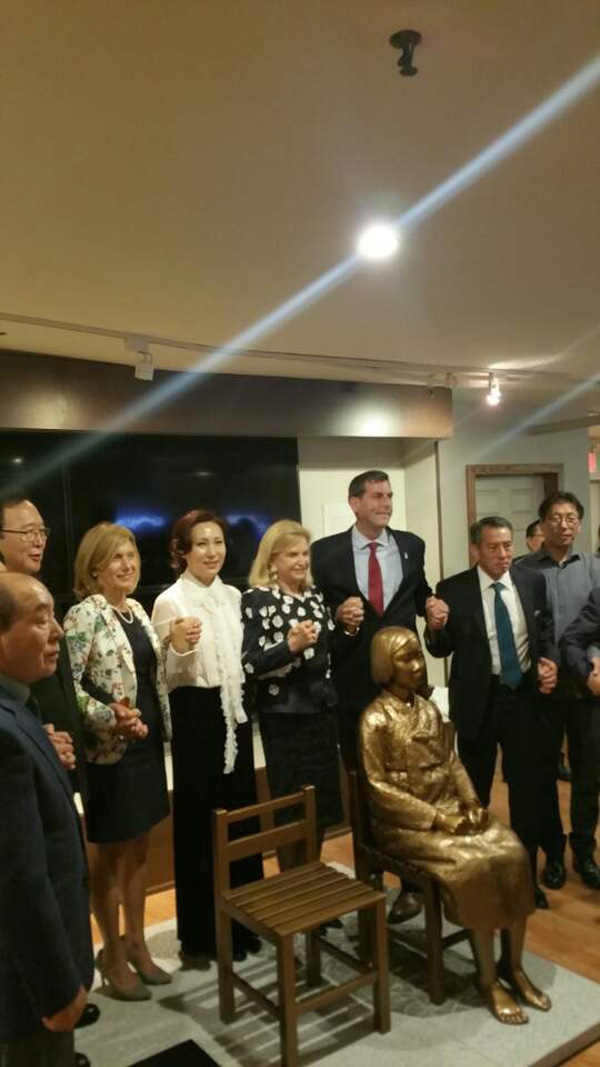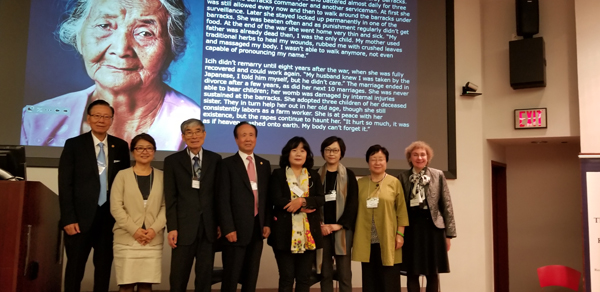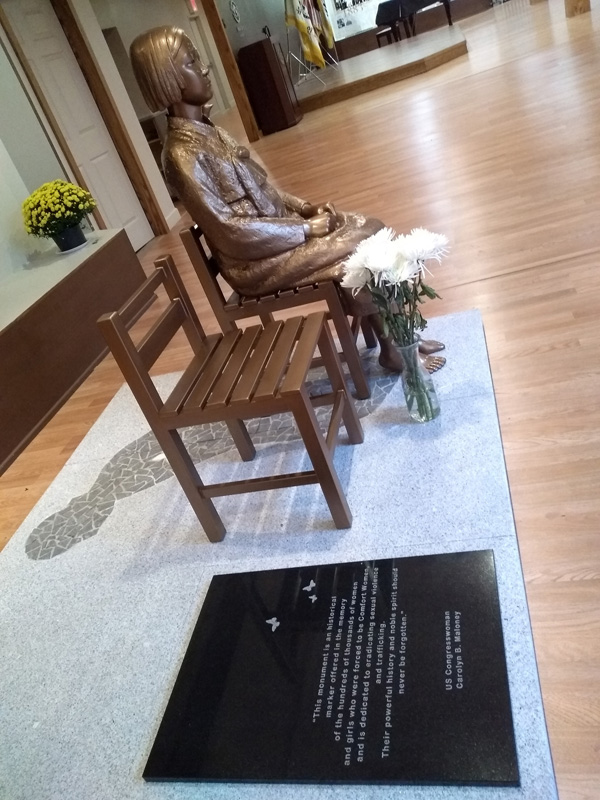
(Clarification: Regarding the original posting of this story, there was some controversy over the Japanese apology. The Japanese consulate said the government had expressed “sincere apologies and remorse.” The Japanese pointed out the governments of Japan and Korean reached an agreement on Dec. 28, 2015, that the comfort women issue had been resolved “finally and irreversibly.” In response to the story, the Korean Consulate General said the question about the apology did not represent a diplomatic rift between the two governments. “The Japanese government has issued apologies in the past, but the incumbent Prime Minister Abe has not from the bottom of his heart,” said Jin Hon, the press attaché for the Korean consulate.)
BY ANNABELLE BLAIR | Statue of Peace, a memorial to “comfort women” who were exploited as sexual slaves by the Japanese military during World War II, was recently unveiled at Chelsea’s Museum of Korean American Heritage (MoKAH), located within W. 24th St.’s Korean American Association of Greater New York (KAAGNY).
The monument depicts a bronze girl in traditional Korean clothes sitting next to an empty chair with the shadow behind her of an old woman. The inscription reads, “This monument is an historical marker offered in the memory of the hundreds of thousands of women and girls who were forced to be comfort women, and is dedicated to eradicating sexual violence and trafficking. Their powerful history and noble spirit should never be forgotten.”
It is an exact replica of the statue outside the Japanese embassy in Seoul, South Korea, and designed by the same artists, Kim Seo-kyung and Kim Eun-sung, who attended the Oct. 13 unveiling.
Historians say up to 200,000 women from at least 13 Asian-Pacific countries and a former Dutch colony in modern Indonesia were forcibly enslaved by the Japanese government and brutally raped by Japanese military officers and personnel. Many were girls — often between 12-19 years old, according to testimonies cited by Margaret Stetz, a professor of women’s studies and humanities at the University of Delaware.
Dr. Pyong Gap Min, a sociology professor and director of the Research Center for Korean Community at Queens College, said the “hyper sexual exploitation” was extremely violent and frequently exposed women to injuries, pain, infertility, vaginal ruptures, and diseases, in addition to beatings, stabbings, and humiliation.
Although Japanese officials have attempted to dismiss the issue by offering token recognition and money to victims, no formal apology for the atrocities committed against comfort women has ever been offered by Japan or accepted by the women themselves — or the many groups and coalitions formed to honor and support the victims.
The Statue of Peace is the first statue for comfort women erected in New York City and the tenth nationwide, according to the Washington Coalition for Comfort Women Issues. Across the United States, 13 comfort women memorials stand in public locations, including inside historical Korean-American associations, according to Min.
The recently erected memorial in Manhattan did not provoke any contention, Min said, because it is located inside a Korean Museum and sponsored by the Korean American Association of Greater New York.
“No one can say anything,” he said.
He noted, however, that the statue’s influence is “minimal” because of its location indoors on the sixth floor of a complex where it will likely attract less attention than it would in a prominent space in New York City.

On the same weekend as the Oct. 13 memorial unveiling, Min also hosted an event to remember comfort women at Queens College in Flushing. The eighth annual conference, called “The Redress Movement for the Victims of Japanese Military Sexual Slavery: Looking Back at the 27-year Movement,” was hosted by the Research Center for Korean Community at Queens College in Flushing. The center is a nonprofit research institute for the local Korean and Korean-American communities in Queens, with the neighborhood of Flushing having one of the largest Asian populations in New York.
At least 17 academics, human rights leaders, and activists presented their research this year and addressed topics, such as shame, legacy, girl-victims, and gender-war crimes. Speakers compared the atrocities experienced by comfort women to the Holocaust, with expressions of “never again.”

Some Japanese officials and citizens deny the testimonies of comfort women. They contend that the women were paid prostitutes and ignore or dispute the 500-plus documents of research that scholars say prove the Japanese government approved of the sexual trafficking.
In the year 2017 alone, Japanese interest groups have fought to have similar comfort women statues in San Francisco and Glendale, CA, removed from prominent public locations.
Academics at the conference emphasized the global importance of the issue, beyond Korea-Japan relations, as the heart of basic human rights, often championed by the United States. “This is not Japan’s history, it is the history of humanity,” Alexis Dudden, a professor of history at the University of Connecticut, said during the conference. “And we all have a right to that history.”
James Park, a New York City resident and Korean-American, said he took the day off work to attend the conference.
“I was literally close to tears,” he said when describing his experience after the conference’s first two sessions. “As a male who doesn’t know this topic, to have it exposed right to your face.”
A year after the first comfort woman came forward in 1991, protesters began gathering weekly in front of the Japanese embassy in Seoul, setting the world record for the longest-running protest on any issue.
“I think it’s time, after 25 years, that we expand our scope of activities with other movements of human trafficking, regardless of gender and regardless of where it’s happening in the world,” Bonnie Oh, a retired professor of Korean studies at Georgetown University, said at the conference.
The Museum of Korean American Heritage is located within The Korean American Association of Greater New York (149 W. 24th St., sixth floor (btw. Sixth & Seventh Aves.). Learn more about them online at nykorean.org and facebook.com/OFFICIALKAAGNY.




























